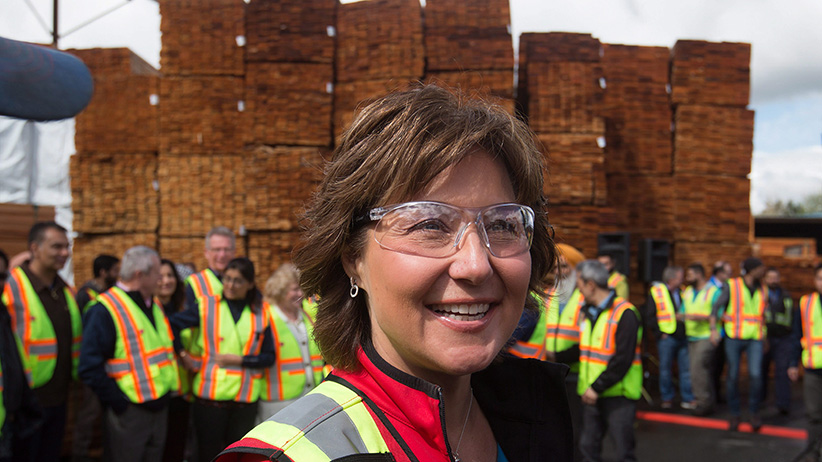Is history repeating itself in the softwood lumber dispute?
Or does Trump mean Lumber V won’t be like I, II, III and IV? A look at the ‘mutating bacteria’ of a high-stakes trade dispute.
Liberal Leader Christy Clark greets workers during a campaign stop at CedarLine Industries, a manufacturer of western red cedar products, in Surrey, B.C., on Monday April 24, 2017. A provincial election will be held on May 9. (Darryl Dyck/CP)
Share

Here’s a tip for new fans of the big leagues of international trade wars. A good indication of when a dispute has established itself as a tradition is when they start using Roman numerals, like they do for Super Bowls and Olympics, to distinguish among its past iterations. So it is with Canada-U.S. battles over softwood lumber, which trade lawyers and bureaucrats routinely allude to as Lumber I, II, III, IV and, starting today, V.
Lumber I broke out way back in 1982, when Pierre Elliott Trudeau was prime minister, and Lumber V is now, of course, a headache for Justin Trudeau, his son, to endure. Donald Trump might turn up the volume on the political rhetoric surrounding the long-running softwood argument, but it’s not yet clear how, if at all, this most bellicose of presidents will change the substance of such a familiar source of bilateral conflict.
According to Harry Nelson, an economist in the University of British Columbia’s forestry faculty, the softwood dispute refuses to die for two main reasons. First, most Canadian lumber is sawn from trees felled on Crown land, whereas most U.S. commercial logging is in privately controlled forests. Americans tend to assume Canadian governments are bound to set royalties for trees cut on public land so low as to amount to an unfair subsidy. “That provides fertile ground where [the U.S. lumber industry] can sow these seeds of doubt,” Nelson says.
The second reason the dispute lumbers on, and on, he says, is because its history proves “protectionism works.” Even though Ottawa has repeatedly prevailed over Washington in key softwood cases brought to the World Trade organization and NAFTA dispute-settlement panels, those victories haven’t stopped the U.S. wood business from harassing its Canadian competitors. Typically, the cycle of legal and regulatory wrangling takes an agonizing five years to run its course, Nelson says, from the time the American lumber lobby files a formal complaint. Facing such lengthy, costly litigation, he says, “It makes economic sense to try and find some kind of resolution.”
And a resolution was what former prime minister Stephen Harper secured back in 2006, when he brought Lumber IV to an end by signing the Softwood Lumber Agreement. The deal amounted to a complex mix of quotas and export taxes, all designed, according to Global Affairs Canada, to promote “a stable and predictable trade environment.” If that doesn’t sound much like the true spirit of free trade, that’s because it was the furthest thing from free trade. It was carefully managed trade.
The deal expired in the fall of 2015, followed by a one-year “standstill” agreement, at the end of which the U.S. lumber sector—in keeping with three decades of grand tradition—filed its inevitable complaint. That led to the U.S. Commerce Department investigating and finding—again in the time-honoured manner—that Canadian governments were indeed unfairly subsidizing their hewers of wood. In retaliation, the U.S. government announced preliminary duties yesterday ranging from three to a punishing 24 per cent, with the final figures to be set late this year.
The Canadian government would gladly settle for something like Harper’s 2006 deal again, assuming Canada’s roughly 30-per cent share of the U.S. softwood lumber market, mostly for framing houses, isn’t seriously jeopardized. That was the kind of agreement Trudeau was seeking in talks with former president Barack Obama. Last spring, they released a joint statement on their aim of arriving at a pact that would “maintain Canadian exports at or below an agreed U.S. market share to be negotiated.”
But a deal with Obama never materialized, so Trudeau finds himself contending with Trump. The big question now hanging over the hard bargaining on softwood is whether the weirdest White House in history will negotiate in an unpredictable way, or whether the old patterns will reappear.
At a news conference in Washington today, Wilbur Ross, Trump’s commerce secretary, was asked what he thought about Canada’s enviable track record for winning cases about lumber against the U.S. at the WTO and NAFTA. “I had nothing to do with the prior cases,” he said in a monotone drawl. “I’m confident that this case is a good case.”
While Ross might lack a lively curiosity about recent history, many of the Canadian players lining up against him are steeped in it. For instance, the Ontario government has signed Jim Peterson, federal Liberal trade minister from 2003-2006, as chief negotiator to protect its forestry sector. Meanwhile, British Columbia, the province with the most at stake, appointed David Emerson, who helped hammer out the 2006 agreement, as its softwood trade envoy. He likened the conflict to “a mutating form of bacteria that has become all but antibiotic resistant.”
Emerson’s boss is B.C. Premier Christy Clark, who is running for re-election just now. Naturally, she staunchly defends B.C.’s forestry companies. Against the criticism that they’ve left themselves too exposed to U.S. trade harrying, she pointed out that they’ve sought new markets: 59 per cent of B.C. softwood exports went to the States in 2015, compared to 82 per cent in 2001.
And on why the U.S. lumber sector is again trying to squeeze its Canadian competition, Clark sounded very much in campaign mode. “The American industry is … driven by greed, pure and simple,” she said recently. It seems Trump won’t have a monopoly on populist messaging as Lumber V unfolds.